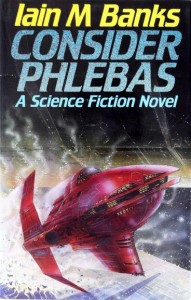
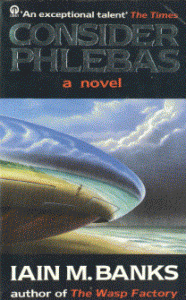
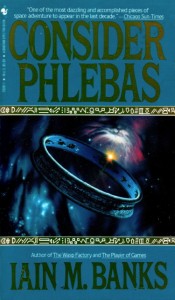
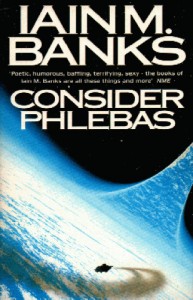
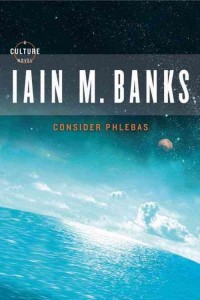
Consider Phlebas
by Iain Banks
Republished by Orbit, 2008
On Amazon
***
When I think of the best science fiction, I never think of it as actual science fiction. Rather, tales of humanity revealing glimpses into its nature that would otherwise be difficult to convey without the facade of artificial quasars and exotic aliens. “Iain Banks has ruined most sci-fi for me,” said a friend who was recommending the Culture series to me. With the recent news that Iain Banks was suffering from a terminal cancer to his gallbladder, I felt it was time to dive into this long and branching series I’d been hearing about for so long. I started with the first book, Consider Phlebas, which on the surface is a space opera with swash buckling action. It’s set to the backdrop of a war that is taking place between the Culture and the religiously fanatical civilization called the Idirans. The machines of the Culture are more complex than humans and have unique personalities that help calculate/determine their future. When the Mind of a brand new Culture ship escapes into a Planet of the Dead, the two factions race to retrieve it. The protagonist is Horza, a shape-changer sent by the Idirans because he has special access to the planet that the others do not.
The title, Consider Phlebas, comes from T.S. Eliot’s The Waste Land and like The Waste Land, there are mixes of satire and futurism in the chapters that balance fantastic elements with descriptions that make it easy for a reader to envision. Take for example, the description of an Orbital (an artificial planet/ring world) being destroyed by the Culture as a result of the war: “…a single narrow line of blinding white light appeared right across the breadth of the day side of the Orbital, a thin fiery blade of silent destruction which was instantly surrounded by the duller but still perfectly white cover of clouds. That line of light was part of the grid itself, the fabric of pure energy which lay underneath the entire universe, separating this one from the slightly younger, slightly smaller antimatter universe beneath… The Orbital was now a rosette of white flat squares backing slowly away from each other toward the stars: four hundred separate slabs of quickly freezing water, silt, land and base material, angling out above or underneath the plane of the system’s planets like flat square worlds themselves. There was a moment of grace then, as Vavatch died in solitary blazing splendor.” I could see Vavatch’s last moments in my head and marveled at the creative way Banks depicted the scene. There are many such moments and the imagery has a palpable intensity to it.
The intensity of the journey is accompanied by a painstaking attention to detail. A game of interstellar Damage highlights the level to which Banks explores his universe. It’s essentially a card game that is played wherever imminent destruction (in this case, Vavatch) awaits as players race not only to beat each other, but time so that they are not destroyed. When they lose a game, they literally lose a life because they must wager with conscious human beings they either have to hire or buy. During the bout, card players can alter the emotional state of rivals and volley them with fear, paranoia, anger, and even love via the devices they are hooked into. Each of the gamers has a history and there are even addicted “Moties” who relish ‘highs’ from the residuals of the emotional dueling that slips out from the game. As a side attraction, there is a slow-motion animal trapeze act with huge beasts fighting via harnesses. The Ishlorsinami are the species who adjudicate the game and are incorruptible officiates. In a smaller subplot, a famous reporter named Sarble the Eye is trying to sneak in so he/she can report on the secret event. And this isn’t even touching on Horza’s role in trying to steal the ship away from his captain who desperately wants to win the game. There’s so much detail here, it’s easy to get immersed and even lost in the world.
Admittedly, the book can have uneven levels of prose with some of the action drawn out too long, especially after they arrive on the Planet of the Dead. While Horza is flushed out as a character, many of his ensemble are stock personalities that seem more like set pieces than actual crew members with agendas of their own. None of that deterred me from reading as I found myself continually drawn in by the innovative concepts. The opening execution scene Horza finds himself in is a particularly ghastly and malodorous way for anyone to die: “One of their few strokes of humor or originality had been devising an elegant, ironic way of death. How fitting it must feel to them, dragging their decrepit frames to the banquet-hall privies, literally to defecate all over their enemies, and thereby kill them.” Banks propels readers from one action scene to another while injecting new ideas and technological marvels that provide multiple crescendos to his opera as it races to its climax.
Unfortunately, the conclusion comes abruptly and the sacrifices Horza’s crew and he make seem almost pointless to the outcome of the actual war. This is explained in an epilogue that summarizes the outcome of the conflict in a few paragraphs and reads like something out of a history book. Banks himself stated: “I guess this approach has to do with my reacting to the cliché of SF’s ‘lone protagonist.’ You know, this idea that a single individual can determine the direction of entire civilizations. It’s very hard for a lone person to do that.” While that makes sense, his words seem to go against the thread of the narrative which shows Horza multiple times surviving against innumerable odds. Science fiction classics like The Forever War and Starship Troopers explore the theme far more effectively, especially with their focus on the team versus the individual in combat and the way ‘heroics’ gets other characters quickly killed.
Where the themes excel come in the form of interludes that introduce a different character from the Culture, Fal’Ngeestra. She is a human, who in conjunction with the Minds, are pulling the strings of Culture agents in their war against the Idirans. It becomes clear her role is less about her place in the plot and more about her as expositor of what the Culture actually represents.
The book could be called Consider the Culture as it juxtaposes the Culture in a study of contrasts. Whether it’s the religious Idirans, a group of cannibals, or Horza himself, seeing the Culture from the eyes of its enemies gives us a varied perspective on what exactly it is. These parts steal the show for me and I was often more interested in what the Culture represented than Horza’s odyssey. Through the Culture, Banks proposes an alternative future, one that is both more optimistic and yet more realistic than the apocalyptic descendants of the Biblical Revelations or even the utopianism of Star Trek (pre-JJ Abrams). The Culture excels because it understands human nature all too well and embraces it rather than trying to manipulate, control, or defy it. The savagery of human nature, the cupidity of its lusts, and even its laziness are all balanced by the sense of discovery, intuition, and will to survive. Super machines called Minds determine policy and these machines have personalities that are as whimsical and cold-bloodingly calculated as humans can be if you multiplied their brain capacity to the nth degree. As Horza realizes when he destroys the mind of a small ship: “The Culture would treat the destruction of craft’s consciousness as murder.” Horza’s intransigent fealty to the crazy Idirans, despite their obvious cruelty and obduracy, comes across as unrealistic and unconvincing until it’s put in the context of contemporary life and the political gridlock we see on the news every day. At its core, this is a book about people, their beliefs, and their ideologies. Horza is a shape-changer who can physically become anyone and yet ironically lacks malleability when it comes to his own mental state. By placing readers in the shoes of an opponent of the Culture, we see exactly what we’d lack without ‘Culture.’
Consider Phlebas defies many of the tropes of science fiction and its existential pinnings are grounded in extraterrestrial politics. It’s a testament to Banks’ writing that his philosophical exposition becomes a dialogue through the journey of the characters that contemplates possibilities a lesser writer would have made transparently preachy. The key word to all of this is ‘consider.’ Imperfect, but brilliant, I am Considering Phlebas and all the culture books after it.
***
Peter Tieryas Liu is considering Phlebas at tieryas.wordpress.com
Tags: Consider Phlebas, Iain Banks, Peter Tieryas Liu

[…] http://htmlgiant.com/reviews/consider-phlebas/ […]
I’ve often been curious about thos book and the series as a whole. Thanks for posting.
Man, my amazon wishlist is already absurd. Guess one more book can’t hurt…
thanks bemightee! It’s a fantastic introduction to the world of Culture and gets even better with the second and third books.
ha ha, I’m in the same boat as you unclelstvan =)
this was very well written. your first two sentences very effectively explain my fascination with science fiction in a way i have never been able to articulate. i’d like to see more science fiction discussed here, and i think it is regrettable that academia and its wannabes denigrate it as ‘genre fiction’ and lump it in with high fantasy, which shares none of its creativity and intellectual robustness.
have you read larry niven? his prose is a little rough around the edges, but i’ve always found his ‘known space’ universe to be the most compelling vibrant of any i’ve read
thanks Abysmal! Part of why I wrote the review was also because I’d love to see more SF discussed here as well, ha ha. I read Niven’s RIngworld a long time ago but should probably revisit. Any specific Niven books you’d recommend?
Can’t wait for your review of THE PLAYER OF GAMES!!
thanks Joe! =)
#TipsHat
#TipsHatBack
tinyurl.com/l3cselt
[…] it revolves around gaming. I did a book review of the first one, Consider Phlebas, for HTMLGiant here, and while this review complements that first part, it also serves as a tribute to Banks with […]
[…] 6, Inversions. My good friend Peter Tieryas Liu has reviewed the first two books in the series, Consider Phlebas and The Player of Games, both of which are excellent, but aren’t even as good as the series […]